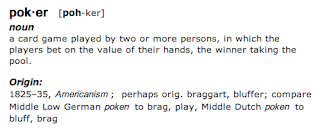I was in graduate school a long time. Long enough to be infected -- briefly, though significantly -- by the literary theory bug to which most of those who go for advanced degrees in English are necessarily exposed.
I choose a disease-related analogy because in the end most of us who put aside the novels and plays and poems and even the criticism written directly about various works of literature to pick up these works labeled “theory” found ourselves momentarily disoriented as though affected by a fever.
Part of the reason for such a response had to do with the head-spinning novelty (I think) of leaving the “primary” texts for a while -- the novels, the plays, the poems -- to read the utterly different, often confounding prose of writers with names like Derrida, Lyotard, Lacan, Bakhtin, Althusser, Spivak, Fanon, and Foucault (the philosopher, not the poker player). Then came the extreme mental gymnastics required when trying somehow to apply these writers’ ideas to the literature we were supposed to be studying.
For a lot of us, the drawing of such connections was mostly beyond our capabilities. But we made the attempt, anyway, because it seemed like everyone else was doing it and, well, we didn’t want to be left behind. Not surprisingly, we wrote a lot of poor, confused essays as a result. And while a few found literary theory enticing enough to become a focus of their studies thereafter, most of us made our way back to the novels and poems and plays once the fever finally broke.
That said, those courses and readings in literary theory did provide me with a few ideas that have stuck with me and proven useful from time to time. In most cases those ideas were in the form of invitations to question certain aspects of a text I might have otherwise taken for granted. You know, things like the cultural conditions under which a given work of literature is produced. Or the relationship between form and content the work exhibits. Or the way the work addresses (or doesn’t address) issues of race, class, and sex. And so on.
One of those useful ideas -- something I probably would’ve never thought much about had I not endured and survived my theory fever -- was the significance of the author to a given piece of writing and how our ideas of the author necessarily affect the way we interpret what we are reading.
It might seem like a simple idea, but whenever we pick up a book we typically make note of the author’s name and thus allow whatever connotations we associate with that name to shape our interpretation of what we read. Right? Even if we don’t know the first thing about the author, as we read we start to form ideas and opinions about who that person might be, and thus our response to what has been written still gets shaped by the notion that someone -- a person we think of as “the author” -- has attempted to communicate something to us via these words we are reading.

It was an essay (actually a lecture) from the late 1960s called “What Is an Author?” by Michel Foucault that probably first introduced this idea to me in a way I could understand. That is to say, the idea that there is what Foucault calls an “author function” we tend to associate with certain kinds of writing or “discourses,” for example, so-called “literary” writing (novels, plays, poems). These would be varieties of discourse in which certain standards occur to us that make the idea of the author important or needful -- in other words, there are certain kinds of writing for which the idea of the author is more important to us than others.
What was really eye-opening for me was the idea that Foucault proposes that the “author function” is something the reader (or the culture, which influences the reader) brings to the text and is not necessarily inherently part of the text itself.
Foucault gives the example of scientific writing and how during the Middle Ages its validity and thus influence (as determined by readers) was often affected greatly by who authored it. But later on, who wrote an article advancing a new scientific discovery was thought to be less important than the discovery itself -- that is to say, the way the text was read and interpreted was less affected by the “author function” than was earlier the case.
One other idea Foucault points out (and he’s not the only literary theorist to come up with this one) is how when we do start thinking about the author of a given text -- or give significance to the “author function” when we read -- that person we’re thinking about is not identical to the person who wrote the sucker. Rather, it’s a limited, skewed version of that person, necessarily shaped in the reader’s mind by the text itself as well as by other cultural factors influencing the reader.
So “Freud is not just the author of The Interpretation of Dreams or the Jokes and Their Relation to the Unconscious; Marx is not just the author of The Communist Manifesto or Das Kapital” writes Foucault. Rather when we read, say, The Interpretation of Dreams, we think about this “Freud” fellow as we do and let our idea of that person affect how we interpret the book. But that person we’re thinking of isn’t Freud. Not really (or utterly).
I’m not going to go any deeper into Foucault’s essay than I already have -- I’ve barely scratched the surface, if you can believe that -- but hopefully you see how just asking the question “What is an Author?” can open us up to all sorts of other questions when it comes to interpreting a piece of writing.
I was reminded of all of this “author function” business recently after reading Diamond Flush’s announcement that Howard Lederer had backed out of his planned-for interview with her following his two long interviews with PokerNews (“The Lederer Files”) and for the Two Plus Two Pokercast (Episode 239).
Actually, Lederer himself already had me occasionally thinking a little bit about the “author function” from things he said in those earlier interviews. For instance, when he attempts to dodge responsibility for various poor decisions by alluding to the “Operating Agreement” or the “owners” or the “board” as if they were the true “authors” of FTP’s demise who were somehow to be understood as distinct from himself.
Or when in the 2+2 interview he responds to a question about FTP continuing to repeat that message to customers that “funds are safe and secure” well after Black Friday -- in fact, all of the way until late September 2011! -- by saying he did not believe “that those words would have been used after April 20 [2011]” and that if they were “it happened without me knowing about it.”
In that latter case, Lederer is suggesting two wildly improbable ideas: (1) he did not read the amended civil complaint in which he himself is named which spells out several instances of Full Tilt Poker telling customers their “funds are safe and secure” and were continuing to do so on September 20, 2011 (the date of the amendment); and (2) he never once visited the Full Tilt Poker website after April 20 where the “funds are safe and secure” message remained prominently displayed until late September 2011 (i.e., until after that first amendment to the civil complaint).
Relatedly, the whole issue of the “author function” comes up again when we think about good old “FTPDoug” (a.k.a. Shyam Markus), i.e., the apparent “author” of many of those “safe and secure” messages. His transformation into “FTPMarkus” in preparation for the launch of FTP 2.0 in November has encouraged all of us to think differently about the significance of a signature and how it isn’t necessarily to be understood as representing “authorship.”
But it was while reading a thread on 2+2 about Lederer’s backing out of the Diamond Flush interview that I found myself thinking most specifically about the “author function,” namely thanks to
a post by Pokercast co-host Mike Johnson regarding Diamond Flush herself.
“I’m not knocking the massively important role she has played in all of this, she has been beyond invaluable,” writes Johnson. “I just personally believe that once you start interviewing the biggest names involved in the story on the record you have officially made the transition from info-leaking blogger to media member. I actually can’t think of any other media person who interviews major news personalities for public consumption anonymously.”
Johnson’s post inspired some interesting discussion about journalistic standards, the so-called “poker media” (and whether it adheres to such standards), as well as blogs and pseudonyms. There were several direct responses to Johnson’s observation, some quite thoughtful. My friend Change100, a.k.a. Kristin (of “Pot Committed”), came up at one point in the discussion. Diamond Flush herself then jumped in with an explanation of her reasons for using a pseudonym and a defense for doing so.
“It’s not the name that’s important,” she argued. “It’s the content.”
Someone later humorously responded that “Diamond Flush is the Isildur of poker insiders.” Another made a Watergate reference by referring to her as “the Deep Throat of poker journalism.” One poster pointed out how DF has appeared on the Pokercast as a guest in the past and Johnson never insisted she identify herself there. And 2+2 Grand Poo-Bah Mason Malmuth hopped in as well to say he believes DF needs to identify herself publicly.
Thinking again about the “author function” and how it affects our understanding and interpretation of the written word, I think this whole debate makes clear that there are certain contexts in which it continues to have great importance, for better or worse.
I think it is interesting that Johnson’s objection to Diamond Flush’s use of a pseudonym was clearly inspired by the content of her posts which to him has reached a certain level of significance (“interviewing the biggest names involved in the story on the record”) that to him changed the nature of the discourse and thus introduced a different standard according to which the identity of the author is somehow more significant. As Johnson says of DF, “you have officially made the transition from info-leaking blogger to media member.”
I certainly see where Johnson is coming from. And, of course, I understand Diamond Flush’s position as well. After all, I started this blog using a pseudonym -- for some of the same reasons DF says she uses one, actually -- and only when I began writing for other poker sites did I begin using my real name for a by-line.
But really, even if a person signs his or her real name to something he or she has written, the “author” of the piece is still going to be distinct from the person who wrote it. The credibility of the piece might be affected by the “author function,” but other contextual factors have as much or more to do with credibility, too, including other texts produced by the same hand, others’ responses to those texts, as well as additional culturally-determined factors regarding journalistic standards.
I’ve written before about how the poker world is filled with characters with multiple identities, with lots of examples of pseudonyms and attempts to participate with anonymity, and with other factors complicating what we might regard as the “author function.” And of course all of that becomes even more evident when it comes to online poker.
There’s a lot more to say about it all, really. But I’ll sign off now. As “Short-Stacked Shamus,” that version of me who regularly -- sometimes feverishly -- writes here.
Labels: *shots in the dark, Diamond Flush, Full Tilt Poker, Howard Lederer, Michel Foucault, Two Plus Two Pokercast








































